OBJECTIVES:
- make sure everybody understands our magazine sections
- learn about some of the UNESCO main topics
- "travels broaden the minds" but only to those who are aware of what we are doing and why.
- learn about and from our past (cultural heritage)
- respect our environment (natural heritage)
- value the dialogue between people (intercultural dialogue)
- exchange school strategies (education)
- promote creativity and shared leadership
- open onto the whole world
- become a digital citizen
ACTIVITY:
- learn about the topics
- get aware of what we actually did during the Corsican LTT
- be able to suggest the right articles in the right section: https://twinspace.etwinning.net/86271/pages/page/655082
- Don't forget that being collaborative is also linked with shared leadership.
EXPLANATION OF COLLABORATIVELY CHOSEN SECTIONS:
A. Cultural heritage includes tangible culture (such as buildings, monuments, landscapes, books, works of art, and artifacts), intangible culture (such as folklore, traditions, language, and knowledge)
Cultural heritage comes in many shapes and forms.
- tangible – for example buildings, monuments, artefacts, clothing, artwork, books, machines, historic towns, archaeological sites.
- intangible – practices, representations, expressions, knowledge, skills - and the associated instruments, objects and cultural spaces - that people value. This includes language and oral traditions, performing arts, social practices and traditional craftsmanship.
- natural – landscapes, flora and fauna.
- digital – resources that were created in digital form (for example digital art or animation) or that have been digitalised as a way to preserve them (including text, images, video, records).
Natural heritage (including culturally significant landscapes, and biodiversity).
1. Special for the teachers
"Cultural education" : https://www.schooleducationgateway.eu/en/pub/viewpoints/interviews/cultural_education_-_prof_bar.htm
2. For the students:
What Is UNESCO World Heritage? Follow this link to watch a first video to learn more about this topic.
https://www.nationalgeographic.com/travel/world-heritage/about/
The European Year of Cultural Heritage: with a great Teaser:
https://europa.eu/cultural-heritage/about.html
More listening examples:
The Great Barrier Reef
http://www.bbc.co.uk/learningenglish/thai/features/6-minute-english/ep-160728
B. Intercultural dialogue: "Through cherishing our cultural heritage, we can discover our diversity and start an inter-cultural conversation about what we have in common. So what better way to enrich our lives than by interacting with something so central to who we are?"
1. Special for the teachers
Unesco core concepts:
https://en.unesco.org/interculturaldialogue/core-concepts
2. For the students: do you know who you are?

Intercultural dialogue to promote good practices!
https://en.unesco.org/interculturaldialogue/
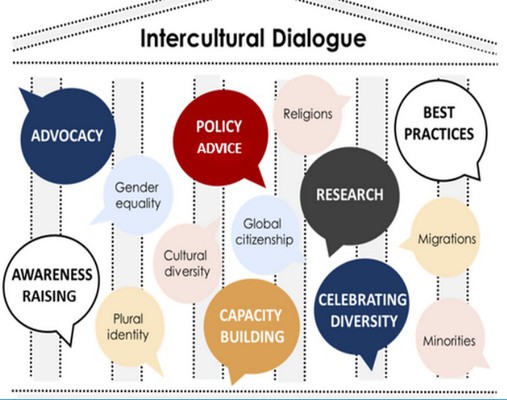
What does intercultural dialogue mean? What competences does it require?
https://en.unesco.org/interculturaldialogue/
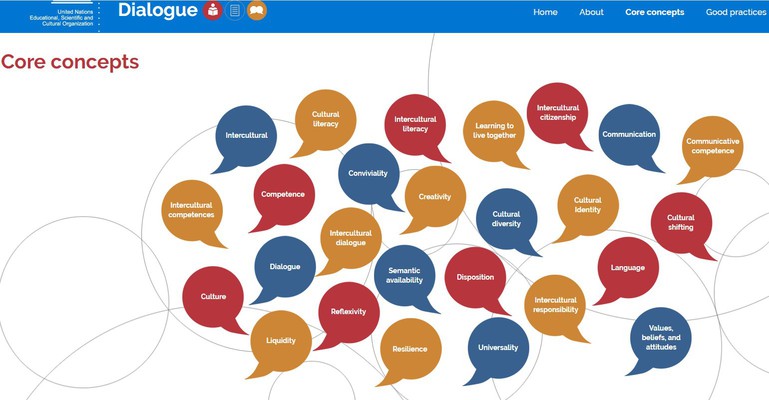
Key pririorities: diversity and inclusion.
https://en.unesco.org/interculturaldialogue/

To leran more:
https://www.coe.int/t/dg4/intercultural/concept_EN.asp
can also be a tool for the prevention and resolution of conflicts by enhancing the respect for human rights, democracy and the rule of law. More specifically, the following goals have been outlined:
- To share visions of the world, to understand and learn from those that do not see the world with the same perspective we do;
- To identify similarities and differences between different cultural traditions and perceptions;
- To achieve a consensus that disputes should not be resolved by violence;
- To help manage cultural diversity in a democratic manner, by making the necessary adjustments to all types of existing social and political arrangements;
- To bridge the divide between those who perceive diversity as a threat and those who view it as an enrichment;
- To share best practices particularly in the areas of intercultural dialogue, the democratic management of social diversity and the promotion of social cohesion;
- To develop jointly new projects.
Read our EUro Citizen Charter:
https://twinspace.etwinning.net/86271/pages/page/785772
C. Digital citizenship & media and social media:
We can discuss those topics online, socialize, using various tools on our Twinspace, but you could also develop Wikis, Blogs, Videos, YouTube channels, online games... to post infographics, wiki contents, tutos... about this topic issues being both learners and actors of this digital world.
1. Special for the teachers
https://www.youtube.com/watch?v=3hao7kpewrU&feature=youtu.be

A more elaborate definition of Digital Citizenship is:
 The competent and positive engagement with digital technologies (creating, working, sharing, socializing, investigating, playing, communicating and learning); participating actively and responsibly (values, skills, attitudes, knowledge) in communities (local, national, global) at all levels (political, economic, social, cultural and intercultural); being involved in a double process of lifelong learning (in formal, informal and non-formal settings) and continuously defending human dignity.
The competent and positive engagement with digital technologies (creating, working, sharing, socializing, investigating, playing, communicating and learning); participating actively and responsibly (values, skills, attitudes, knowledge) in communities (local, national, global) at all levels (political, economic, social, cultural and intercultural); being involved in a double process of lifelong learning (in formal, informal and non-formal settings) and continuously defending human dignity.
Being a child in the Age of Technology Handbook: a handbook to provide ideas of articles, motivational posters and more!
https://www.coe.int/en/web/digital-citizenship-education/-/being-child-in-the-age-of-technology-difgital-cititzenship-education-handbook
2. For the students
A great website for ESL learners:
https://hyer.hpisd.org/apps/pages/index.jsp?uREC_ID=209128&type=d&pREC_ID=808822
Infographic: I'm a digital citizen!
https://www.iste.org/explore/infographic-im-digital-citizen
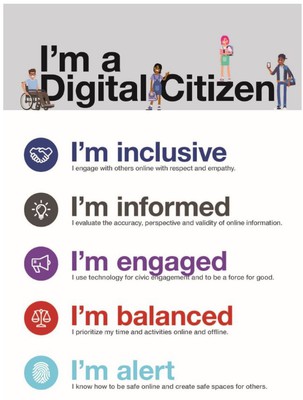
eSafety:
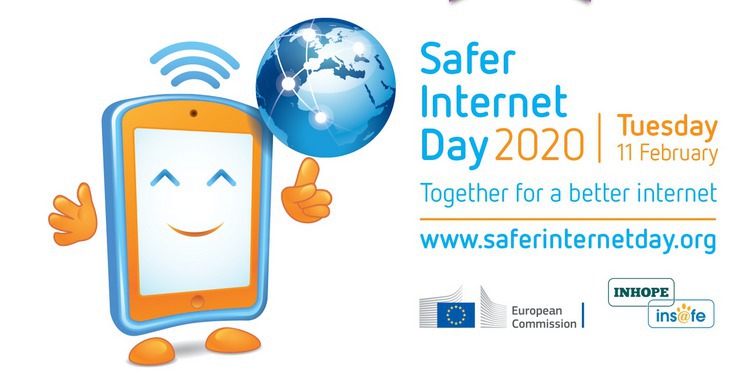
You can watch our videos again:
https://twinspace.etwinning.net/86271/pages/page/755875
And read our Digital Citizen Charter:
https://twinspace.etwinning.net/86271/pages/page/887258
D. Education: comparing, arguing... and sharing good practices and strategies.
1. Special for the teachers
Towards a European Education Area: "The Commission is developing initiatives to help establish a European Education Area enabling all young people to benefit from the best education and training, and to find employment across Europe."
https://ec.europa.eu/education/education-in-the-eu/european-education-area_en
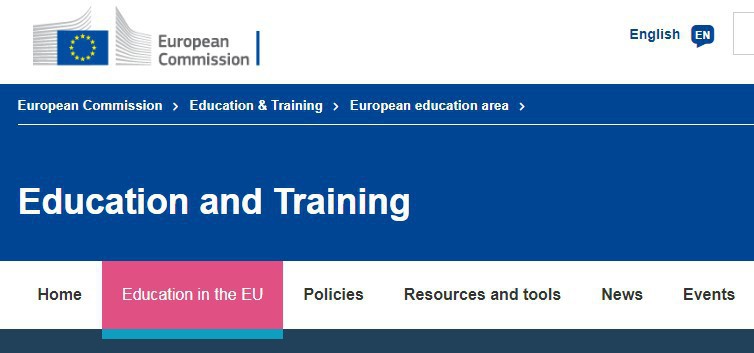
Better Education for better Democracies:

https://www.coe.int/en/web/education/